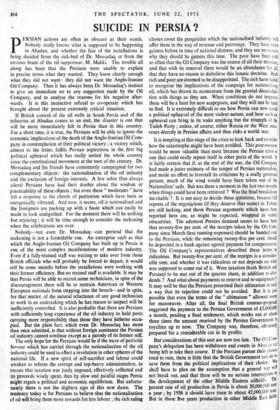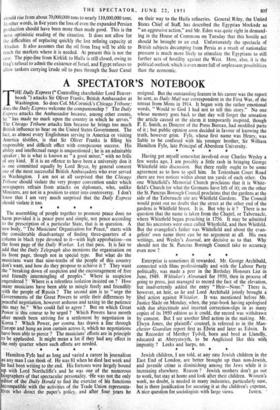SUICIDE IN PERSIA ?
pERSIAN actions are often as obscure as their words. Nobody really knows what is supposed to be happening in Abadan, and whether the fate of the installations is being decided from the sick-bed of Dr. Mossadaq or from the envious brain of the oil rapponeur, M. Makki. The trouble all along has been that the Persians were unable to explain in precise terms what they wanted. They knew clearly enough what they did not want: they did not want the Anglo-Iranian Oil Company. Thus it has always been Dr. Mossadaq's instinct to give an immediate no to any suggestion made by the Oil Company, and to analyse the reasons for his negative after- wards. It is this instinctive refusal to co-operate which has brought about the present extremely critical situation.
If British control of the oil wells in South Persia and of the refineries at Abadan comes to an end, the disaster is one that will be more immediately felt in .Persia than in this country. For a short time, it is true, the Persians will be able to ignore the economic implications of the death of the Anglo-Iranian Oil Com- pany in contemplation of their political victory ; a victory which, almost to the letter, fulfils Persian aspirations in the first big political upheaval which has really united the whole country since the constitutional movement at the turn of the century. Dr.
Mossadaq and his friends have consistently campaigned for two complementary objects: the nationalisation of industry . the oil indust and the exclusion of foreign interests. A few sober (but always silent) Persians have had their doubts about the wisdom or practicability of these objects ; but even these " moderates " have felt a response to the chords of patriotism which have been so energetically vibrated. And now, it seems, oil is nationalised and the foreigners are packing up with a haste which can easily be made to look undignified. For the moment there will be nothing but rejoicing ; it will be time enough to consider the reckoning when the celebrations are over.
Nobody—not even Dr. Mossadaq—can pretend that the reckoning is not a formidable one. An enterprise such as that which the Anglo-Iranian Oil Company has built up in Persia is one of the most complex manifestations of modern industry. Even if a fully-trained staff was waiting to take over from those British officials who will probably be forced to depart, it would still be some months before the installations were working with their former efficiency. But no trained staff is available. It may be that Persia will be able to recruit some technicians, in spite of the discouragement there will be to restrain American or Western European nationals from stepping into the breach—and in spite, for that matter, of the natural reluctance of any good technician to work in an undertaking which he has reason to suspect will be inefficiently controlled. It is also probable that there are Persians with sufficiently long experience of the oil industry to hold posts carrying more responsibility than those they have hitherto occur pied. But the plain fact, which even Dr. Mossadaq has more than once admitted, is that without foreign assistance the Persian oil industry cannot continue except as a parody of its former self. The only hope for the Persians would be if the wave of patriotic fervour which has carried through the nationalisation of the oil industry could be used to effect a revolution in other spheres of the national life. If a new spirit of self-sacrifice and labour could awaken to reform the corrupt and top-heavy administration, to ensure that taxation was justly, imposed, effectively collected and its proceeds wisely spent, then by slow and painful stages Persia might regain a political and economic equilibrium. But unfortu- nately there is not the slightest sign of this new dawn. The tendency today is for Persians to believe that the nationalisation of oil will bring them more rewards for less labour ; the rich ruling classes covet the perquisites which the nationalised industry win offer them in the way of revenue and patronage. They have been gainers before in time of national distress, and they see no reason why they should be gainers this time. The poor have been told so often that the Oil Company was the source of all their miseries, and that with its removal there would be an abundance for all, that they have no reason to disbelieve this lunatic doctrine. Both rich and poor are doomed to be disappointed. The rich have failed , to recognise the implications of the campaign for nationalising oil, which has drawn its momentum from the general dissatisfao. tion with things as they are. When conditions do not improve there will be a hunt for new scapegoats, and they will not be had to find. It is extremely difficult to see how Persia can now avow a political upheival of the most violent nature, and how such al upheaval can bring in its wake anything but the triumph of the Tudeh Party ; unless, of course, either Russia or the West inlet. venes directly in Persian affairs and thus risks a world war.
It is tempting at this stage of the crisis to look back and consider how the catastrophe might have been avoided. This post-mortem would be more valuable than most because the Persian crisis is one that could easily repeat itself in other parts of the world. It is fairly certain that if, at the end of the war, the Oil Company had made a juster estimate of the temper of Persian nationalism, and made an effort to forestall its criticisms by a really generous gesture, much of the wind would have been taken out of the Nationalists' sails. But was there a moment in the last two months when things could have been retrieved ? Was the final breakdown inevitable ? It is not easy to decide these questions, because full reports of the negotiations (if .they deserve that name) in Tehran are still lacking, and those Persian arguments which have been reported here are, as might be expected, wrapped in verbal obscurities. The adamant Persian demand seems to have been that seventy-five per cent. of the receipts taken by the Oil Com- pany since March (less running expenses) should be handed ova to the Persians, while the remaining twenty-five per cent. should be deposited in a bank against agreed payment for compensation. The Oil Company's representatives described these terms as ridiculous. But twenty-five per cent. of the receipts is a consider• able sum, and whether it was ridiculous or not depends on what was supposed to come out of it. Were taxation (both British and Persian) to be met out of the quarter share, in addition to divi- dends ? And what about payments to reserve and re-equipment? It may well be that the Persians presented their ultimatum in such a way that its rejection could not be avoided. But it is just possible that even the terms of the " ultimatum " allowed room for manoeuvre. After all, the final British counter-proposal. suggested the payment to the Persian Government of £3,000.000 a month, pending a final settlement, which works out at about three times the amount received by the Persian Government royalties up to now. The Company was, therefore, oh% iously prepared for a considerable cut in its profits.
Bulconsiderations of this sort are now too late. The 0:1 Corn- pany's delegation has been withdrawn and events in Ab.ium ale being left to take their course. If the Persians pursue their chosen road to ruin, there is little that the British Government can do to save them from the political implications of their choice. We shall have to plan on the assumption that a general war will not break out, and that there will be no serious interruption in the development of the other Middle Eastern oilfields. The present rate of oil production in Persia is about 30,000,000 tons a year ; by 1956 it should have risen to about 42,000,000 l°14* But in those five years production in other Middle East fields should rise from about 70,000,000 tons to nearly 110,000.000 tons. In other words, in five years the loss of even the expanded Persian production should have been more than made good. This is the most optimistic reading of the situation. It does not allow for the difficulties of replacing quickly the lost refining capacity at Abadan. It also assumes that the oil from Iraq will be able to reach the markets where it is needed. At present this is not the case. The pipe-line from Kirkbk to Haifa is still closed, owing to Iraq's refusal to admit the existence of Israel, and Egypt refuses to allow tankers carrying brude oil to pass through the Suez Canal on their way to the Haifa refineries. General. Riley. the United States Chief of Staff, has described the Egyptian blockade as "an aggressive action," and Mr. Eden was quite right in demand- ing in the House of Commons on Tuesday that this hostile act should be brought to an end. Unfortunately the spectacle of British subjects decamping from Persia as a result of nationalist pressure is much more likely to stimulate the Egyptians to still further acts of hostility against the West. Here, also, it is the political outlook which is even more full of unpleasant possibilities than the economic.



















































 Previous page
Previous page